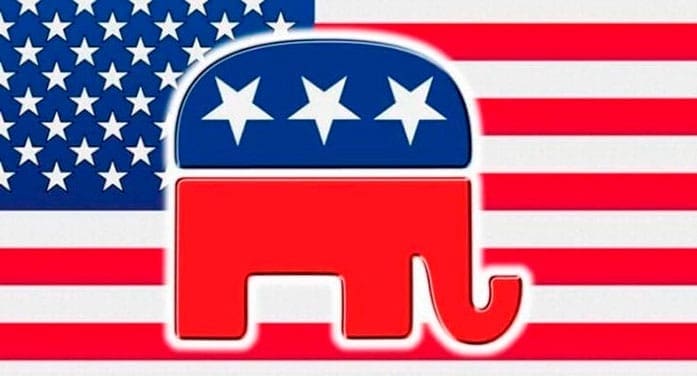 Believe it or not, it’s almost 40 years since Americans last had a suspenseful presidential convention. It happened in 1976, when Ronald Reagan’s insurgency came within a whisker of denying the Republican nomination to the incumbent president, Gerald Ford. Since then the nominations, whether Republican or Democrat, have been securely locked-up well before convention time.
Believe it or not, it’s almost 40 years since Americans last had a suspenseful presidential convention. It happened in 1976, when Ronald Reagan’s insurgency came within a whisker of denying the Republican nomination to the incumbent president, Gerald Ford. Since then the nominations, whether Republican or Democrat, have been securely locked-up well before convention time.
But political analyst Sean Trende thinks that next year’s Republican contest may break that pattern. He believes it’s plausible to envision four or five credible and evenly matched candidates coming through the early primaries, after which no one really has an incentive to drop out. Should that happen, a contested convention would be on the cards.
Trende has a couple of reasons for his hunch.
One has to do with what he describes as “the deepest GOP field in a very long, long time.” By Iowa caucus day, there could be as many as 10 serious contenders. Indeed, Trende reckons that someone could win Iowa with as little as 12 percent of the vote!
The other reason relates to the fact that a number of the prospective candidates appeal to different wings of the party, and have different fundraising sources. Taken in conjunction with recent developments in campaign financing, this suggests that anyone who survives the early winnowing process will have both the motive and the wherewithal to continue until the convention.
Thinking about Trende’s hypothesis, I’d have to go back to 1980 to find a Republican field with comparable depth. In addition to the ultimate winner, Ronald Reagan, the starting list included the likes of the elder George Bush, Howard Baker, Bob Dole and John Connally. While some of those names may be distant memories now, they were a pretty estimable bunch in 1980.
Bush, of course, later went on to become president. Baker was the Republican star on the Senate Watergate Committee, and the smart money’s tip for the nomination. Dole had been the Republican vice-presidential nominee in 1976, and subsequently got the presidential nod in 1996. And the Democrat-turned-Republican Connally was a charismatic former Treasury Secretary who was very popular with Wall Street.
Depth notwithstanding, that Republican race was finished long before the convention. After an early slip in Iowa, Reagan regained his footing in New Hampshire and proceeded to quickly blow away the rest of the field. And although Bush stubbornly hung-in until late May, the contest was effectively over well before that.
Mind you, if the 1980 precedent seems to militate against Trende’s hypothesis, there’s a caveat to be borne in mind. Contrary to most of the pundits at the time, that particular nomination was always Reagan’s to lose.
But 2016 doesn’t have a similarly situated front-runner. Granted, by virtue of muscling the hapless Mitt Romney out of the race, Jeb Bush now leads the early polling. However, his margin is no more than a couple of percentage points and his total support level is a long way short of being intimidating.
In addition, Bush has significant problems with a large chunk of the Republican base, so much so that they’re not inclined to trust him. And while those problems aren’t necessarily insoluble, finessing them will require a deft touch.
That said, if Bush is to be denied, someone will have to beat him, which’ll require two things. First, showing relatively well in the winnowing stages, and second, having the ability to build on that early level of support.
The two guys currently within a couple of points of Bush – Mike Huckabee and Rand Paul – are dubious from that second perspective. Huckabee’s explicit evangelism gives him a reliable floor but a low ceiling, while Paul’s brand of libertarianism is a shade too quirky.
There is, however, someone who might find the sweet spot. Having now been elected governor three times in a state where no Republican has won presidentially since 1984, Wisconsin’s Scott Walker could be the one to watch.
As the state’s public sector unions discovered the hard way, you underestimate Walker at your peril. He may lack conventional charisma, but his pragmatic resoluteness has electoral staying power.
So, even if it doesn’t quite go all the way to the convention, Trende may be right about the “chaotic and utterly unpredictable” nature of the race. Sounds like great fun for political junkies.
Pat Murphy casts a history buff’s eye at the goings-on in our world. Never cynical – well perhaps a little bit.
The views, opinions and positions expressed by columnists and contributors are the author’s alone. They do not inherently or expressly reflect the views, opinions and/or positions of our publication.


